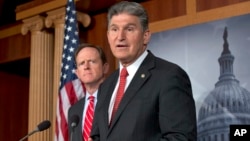The U.S. Senate is beginning debate on one of the most controversial and emotional bills it is likely to take up this year: gun control.
The Democratic-led Senate is likely to defeat efforts by some conservative Republicans to block the bill from consideration.
A compromise between two pro-gun senators, Joe Manchin and Republican Pat Toomey, over expanding background checks for gun buyers opened the door for the debate to begin. The compromise would require checks at gun shows and on the Internet, but would exclude sales between friends and family members.
President Barack Obama, who has pushed for stronger gun-control laws since last December's massacre of 26 children and teachers at an elementary school in Newtown, Connecticut, praised the accord, saying it will make it "harder for dangerous people" to obtain a gun.
The National Rifle Association, the powerful gun owners group, issued a statement opposing the agreement, but said it was "a positive development" since it fell short of the wide-ranging background check system sought by Obama and many gun control advocates. The NRA opposes any new gun control measures as an infringement on the constitutional right to own weapons.
The compromise between Manchin and Toomey also includes greater gun rights, such as allowing gun dealers to sell their products across state lines.
Senators will also debate two provisions that would ban military-style assault weapons and limit the number of bullets a magazine can carry. Both provisions will likely be defeated.
Any gun control legislation must also pass the Republican-controlled House of Representatives.
Several states, including Connecticut, Colorado and Maryland, have enacted their own gun control laws in the aftermath of the Newtown tragedy.
The Democratic-led Senate is likely to defeat efforts by some conservative Republicans to block the bill from consideration.
A compromise between two pro-gun senators, Joe Manchin and Republican Pat Toomey, over expanding background checks for gun buyers opened the door for the debate to begin. The compromise would require checks at gun shows and on the Internet, but would exclude sales between friends and family members.
President Barack Obama, who has pushed for stronger gun-control laws since last December's massacre of 26 children and teachers at an elementary school in Newtown, Connecticut, praised the accord, saying it will make it "harder for dangerous people" to obtain a gun.
The National Rifle Association, the powerful gun owners group, issued a statement opposing the agreement, but said it was "a positive development" since it fell short of the wide-ranging background check system sought by Obama and many gun control advocates. The NRA opposes any new gun control measures as an infringement on the constitutional right to own weapons.
The compromise between Manchin and Toomey also includes greater gun rights, such as allowing gun dealers to sell their products across state lines.
Senators will also debate two provisions that would ban military-style assault weapons and limit the number of bullets a magazine can carry. Both provisions will likely be defeated.
Any gun control legislation must also pass the Republican-controlled House of Representatives.
Several states, including Connecticut, Colorado and Maryland, have enacted their own gun control laws in the aftermath of the Newtown tragedy.




